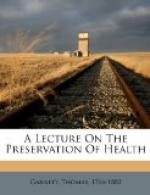By similar experiments to those I have mentioned, we get the azote pure; here is some, in which a candle has burnt out, and in which nothing but azote, or the impure part of the atmosphere is left. [4] I shall plunge a lighted match into it, and you see it is instantly extinguished.
Some metals, and particularly manganese, when exposed to the atmosphere, attract the vital air from it, without touching the azote; and it may be procured from these metals by the application of heat, in very great purity. Here is a bottle of that kind of air, which I have expelled by heat from manganese; I shall plunge a taper into it, and you will perceive that it burns with great brilliancy. An animal shut up in it, would live about four times as long as if shut up in an equal quantity of atmospheric air.
If I take three parts of azote, and one of vital air, I shall form a compound which is similar to the atmosphere, and which is the mixture best suited to support the health of the body; for if there were a much greater proportion of vital air, it would act too powerfully upon the system, and bring on inflammatory diseases; it would likewise by its stimulus exhaust the excitability, and bring us sooner to death; and in the same manner that a candle burns brighter in vital air, and would therefore be sooner exhausted, so would the flame of life be sooner burnt out.
On the contrary, if the atmosphere contained a much less proportion of vital air, it would not stimulate the body sufficiently; the excitability would morbidly accumulate, and diseases of debility would occur.
Combustion, putrefaction, and the breathing of animals, are processes which are continually diminishing the quantity of vital air contained in the atmosphere; and if the all-wise author of nature had not provided for its continual re-production, the atmosphere would in all probability have long since become too impure to support life; but this is guarded against in a most beautiful manner.
Water is not a simple element, as has been supposed, but is composed of vital air, and a particular kind of air which is called inflammable; the same that is used to fill balloons. It has been found by experiment, that one hundred pounds of water, are composed of eighty-five pounds of vital air, and fifteen of inflammable air. [5]
Water may be decompounded by a variety of means, and its component parts separated from each other.
Vegetables effect this decomposition; they absorb water, and decompose it in their glands; and taking the inflammable air for their nourishment, breathe out the vital air in a state of very great purity; this may be ascertained by a very easy experiment.
This vital air is received by animals into their lungs, gives them their heat, and communicates a red colour to their blood; when animals die for want of vital air, their blood is always found black.




